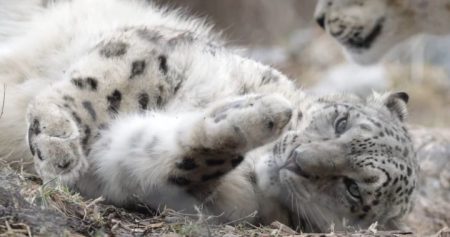Chelsea Paquette, a conservation coordinator at Granby Zoo outside Montreal, is participating in a study on how animals react to a solar eclipse. The zoo has selected 12 species, including Asian Himalayan Black Bears, Red Pandas, snow leopards, zebras, and ostriches, totaling 50 animals for the study. The study was proposed by local astronomer Pierre Chastenay, who will be observing the zoo’s community of Japanese Macaque monkeys during the eclipse. Chastenay believes that the eclipse will have an interesting effect on the social interaction of the monkeys.
This will mark Chastenay’s fourth eclipse experience, as he has traveled to various locations, including Australia, to witness the rare celestial event. The path of totality for Monday’s eclipse runs over Chastenay’s home and the nearby zoo, prompting him to propose the study on animal behavior during an eclipse. The researchers believe that the darkness, drop in temperature, and increase in wind during the eclipse will influence the animals’ behavior. The team has already spent time observing the animals’ normal behavior for comparison after the eclipse.
The researchers at Granby Zoo are collaborating with the Fort Worth Zoo in Texas for this study. Dr. Adam Hartstone-Rose, a professor of biological sciences at North Carolina State University in Raleigh, is working with graduate students to observe animals in Fort Worth during the eclipse. Hartstone-Rose previously conducted a similar study during the 2017 eclipse, where about three-quarters of the animals observed showed a notable reaction. Most animals appeared to exhibit a circadian response, acting as if it was nighttime during the eclipse, with some animals showing signs of anxiety.
Some of the animals in Hartstone-Rose’s previous study had unexpected reactions during the eclipse. For example, the zoo’s giraffe started galloping, which was a behavior not typically observed. The Komodo Dragon, the world’s largest lizard, also showed strong reactions during the eclipse, running around and climbing the walls of its enclosure. The rarity of eclipses makes studying animal behavior during these events challenging, as there are fewer scientific studies on this topic compared to others. Hartstone-Rose hopes that the results of this project will help fill that gap in knowledge.
Hartstone-Rose finds studying animal behavior during an eclipse to be more interesting than observing the eclipse itself. The researchers are using the data collected during the study to analyze the animals’ reactions to the eclipse and compare them to their usual behavior. The study aims to provide insights into how animals respond to rare natural events like solar eclipses and how these events can impact their behavior and daily routines. The results of the study could contribute to a better understanding of how animals perceive and react to changes in their environment during extraordinary events like eclipses.














